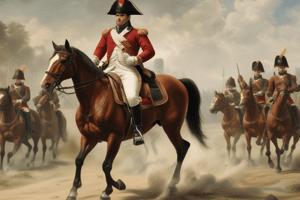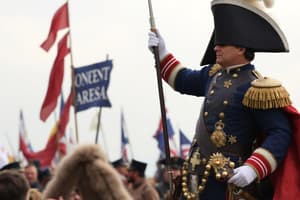Podcast
Questions and Answers
What event led to Napoleon's first command as a general in Paris?
What event led to Napoleon's first command as a general in Paris?
- His victories in Italy
- The siege of Toulon (correct)
- The French Army's campaign in Egypt
- The Corsican nationalist movement
When did Napoleon stage a coup d'état and became the first Consul of the French Republic?
When did Napoleon stage a coup d'état and became the first Consul of the French Republic?
- January 30, 1803
- December 25, 1797
- November 9, 1799 (correct)
- October 12, 1801
What was the significance of the French Army's campaign to Egypt for Napoleon?
What was the significance of the French Army's campaign to Egypt for Napoleon?
- It put an end to his military career
- It positioned him near the British colonies in India (correct)
- It allowed him to establish the Napoleonic Code
- It increased his power within France
What was the name of the constitution established by Napoleon that gave him significant power?
What was the name of the constitution established by Napoleon that gave him significant power?
During which years did Napoleon rule as Emperor of France?
During which years did Napoleon rule as Emperor of France?
What was the primary reason for Napoleon's abdication in 1814?
What was the primary reason for Napoleon's abdication in 1814?
What was a key factor contributing to the near invincibility of Napoleon's army?
What was a key factor contributing to the near invincibility of Napoleon's army?
Where was Napoleon exiled following his defeat at the Battle of Waterloo?
Where was Napoleon exiled following his defeat at the Battle of Waterloo?
Flashcards are hidden until you start studying
Study Notes
- Napoleon Bonaparte was born on August 15, 1769, on the island of Corsica, which was then a French territory.
- He was an Italian of Tuscan origin, but studied in France from a young age and adopted the French version of his name, Napoleon Bonaparte.
- Napoleon was initially a Corsican nationalist, but shifted his allegiance to the French Revolution after meeting Pascual Paoli, a Corsican leader who sided with the British.
- He rose to fame as an artillery commander during the siege of Toulon, which led to his first command as a general in Paris during a royalist uprising.
- Napoleon's victories in Italy established his reputation as a strategic and brave military leader.
- In 1798, he led the French Army to Egypt, which was strategically important due to its proximity to the British colonies in India.
- After returning to France, Napoleon found his power limited and began to hear calls for him to seize control of the government.
- On November 9, 1799, Napoleon staged a coup d'état and became the first Consul of the French Republic.
- He established a new constitution, known as the Constitution of the Year VIII, which gave him significant power and allowed him to rule as a virtual dictator.
- In 1804, Napoleon crowned himself Emperor of the French, establishing the Napoleonic Empire.
- Napoleon's Napoleonic Code, which he initiated in 1801, remains the law code in France and much of Europe today.
- Napoleon ruled as Emperor until his fall in 1814.- Napoleon Bonaparte ruled France from 1804 to 1814, during which time he expanded the French Empire to include most of Continental Europe.
- The Napoleonic Wars were a series of conflicts, primarily between France and European coalitions, lasting from 1803 to 1815. These wars saw Napoleon's empire reach its greatest extent, with control over Germany, Italy, Spain, Switzerland, and parts of Poland.
- Napoleon promoted officers based on merit rather than birth or rank, making his army nearly unbeatable.
- The French Empire directly controlled areas such as Germany, Italy, Spain, Switzerland, and parts of Poland.
- In 1814, after numerous defeats, the Coalition forces entered Paris and forced Napoleon to sign the Treaty of Fonteiveille, leading to his abdication and subsequent exile to the island of Elba.
- Napoleon escaped from Elba and returned to France in March 1815, regaining the throne but being defeated at the Battle of Waterloo in June 1815.
- Following his defeat at Waterloo, Napoleon was exiled to the island of Saint Helena, where he lived until his death in 1821.
- During Napoleon's reign, his younger brother, Louis de Provence, was restored as King Louis XVII, but many of Napoleon's generals and ministers remained in power.
- Napoleon's empire was characterized by military conquests and centralized power. He is remembered as a victorious general who ruled a large portion of Europe.
Studying That Suits You
Use AI to generate personalized quizzes and flashcards to suit your learning preferences.




